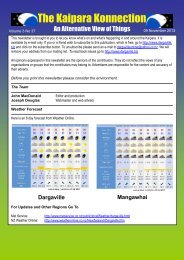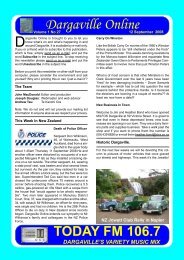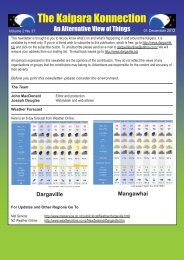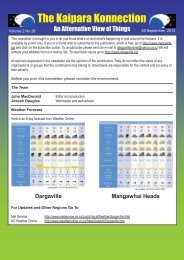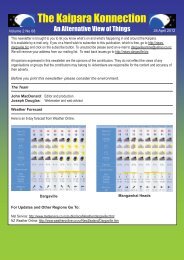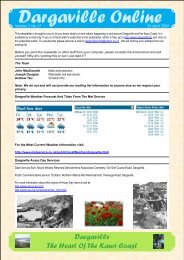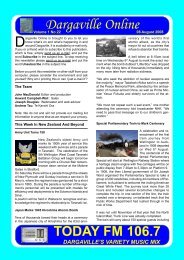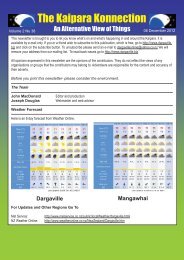15th - Kaipara Konnection - Dargaville.BIZ
15th - Kaipara Konnection - Dargaville.BIZ
15th - Kaipara Konnection - Dargaville.BIZ
Create successful ePaper yourself
Turn your PDF publications into a flip-book with our unique Google optimized e-Paper software.
I hope I didn’t bore you too much with my life story.<br />
Elvis Presley<br />
union would result in the loss of ‘loving service’. The domestic workers who complained about their lot, she concluded,<br />
were ‘mainly those who were incompetent’. Women’s groups that might have been expected to support better conditions<br />
for their ‘sisters’ also struggled to accept the need for a union. Domestic service was seen as ideal preparation for<br />
marriage; ‘no girl can do better or higher work than that of making a home happy and comfortable’ (even if it wasn’t her<br />
own home).<br />
Ironically, it was having a domestic servant on call that gave many middle-class women the freedom to escape the<br />
confines of their home environment. This freedom was often used to pursue interests that were seen as improving New<br />
Zealand society and the position of women in it.<br />
An administrative blunder gave opponents of the union an opportunity to nip it in the bud. In mid-1907 Marianne Tasker<br />
left New Zealand to visit Britain. The acting secretary failed to re-register the union and the Registrar of Industrial Unions<br />
cancelled its registration. To add insult to injury, the Registrar justified his decision on the grounds that a domestic was<br />
not a ‘worker’, because ‘domestic servants were kept for comfort and convenience’.<br />
Image: Domestic Servants wanted poster<br />
23 September 1887 Tongariro mountains gifted to Crown<br />
In February 1887, newspapers reported Ngāti Tūwharetoa’s proposal to gift the mountain tops of Tongariro, Ngāuruhoe<br />
and Ruapehu to the Crown for the purpose of establishing a national park. The Te Aroha News suggested that the gift<br />
was ‘one of the best proofs yet afforded of the gradual extinction of native superstition, for Tongariro has been strictly<br />
tapu’. In reality, the gift reflected Ngāti Tūwharetoa’s ongoing concern for its sacred mountains.<br />
In early 1886 a Native Land Court hearing was held in Taupō to determine ownership of various blocks of land within<br />
Taupō-nui-a-Tia. Approximately 600 people attended, including the paramount chief of Ngāti Tūwharetoa, Horonuku<br />
(Te Heuheu Tūkino IV). Horonuku was reportedly concerned about the inclusion of the iwi’s sacred mountains in the<br />
proceedings. In his book, The Tongariro National Park, historian James Cowan recounted Horonuku’s concerns, as<br />
voiced to his son-in-law Lawrence Grace: If our mountains of Tongariro are included in the blocks passed through the<br />
Court in the ordinary way, what will become of them? They will be cut up and perhaps sold, a piece going to one pakeha<br />
and a piece to another. They will become of no account, for the tapu will be gone. Tongariro is my ancestor, my tupuna;<br />
it is my head; my mana centres round Tongariro. My father’s bones lie there today. You know how my name and history<br />
are associated with Tongariro. I cannot consent to the Court passing these mountains through in the ordinary way. After<br />
I am dead, what will be their fate? What am I to do about them? Grace, the member of the House of Representatives for<br />
Tauranga, reportedly advised Horonuku that the only way to preserve the mountains ‘as places out of which no person<br />
shall make money’ was to ‘make them a tapu place of the Crown, a sacred place under the mana of the Queen’.<br />
The suggestion was placed before the Judge, Major David Scannell, and ‘by common consent the mountain tops were<br />
left in the hands of Horonuku and his family’. A preliminary deed of gift offering the peaks to the Crown was drawn up,<br />
signed by Horonuku, and sent to the government. The peaks were formally offered to the government in a deed signed<br />
the following year. The 1887 gift of 6518 acres (2638 ha) became the ‘nucleus of the proposed Tongariro National Park’<br />
– the first national park in New Zealand and the fourth in the world. Over the next 20 years<br />
the government sought to obtain further land with which to establish the park. It was formally<br />
constituted by Act of Parliament in 1894 but not gazetted until 1907, when sufficient land<br />
was in Crown title.<br />
Horonuku’s ‘gift’ of the mountain peaks is currently being considered by the Waitangi<br />
Tribunal as part of its National Park inquiry.<br />
Painting: Lake Taupō with Tongariro National Park in the distance<br />
New AsiAN RestAuRANt<br />
RestAuRANt<br />
73 Victoria Street <strong>Dargaville</strong>. Phone (09) 439 8388<br />
Dine in - Takeaways - Open 7 Days - Licenced



